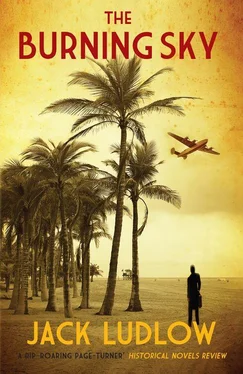Jack Ludlow - The Burning Sky
Здесь есть возможность читать онлайн «Jack Ludlow - The Burning Sky» весь текст электронной книги совершенно бесплатно (целиком полную версию без сокращений). В некоторых случаях можно слушать аудио, скачать через торрент в формате fb2 и присутствует краткое содержание. Год выпуска: 2011, ISBN: 2011, Издательство: Allison & Busby, Жанр: Шпионский детектив, на английском языке. Описание произведения, (предисловие) а так же отзывы посетителей доступны на портале библиотеки ЛибКат.
- Название:The Burning Sky
- Автор:
- Издательство:Allison & Busby
- Жанр:
- Год:2011
- ISBN:9780749008321
- Рейтинг книги:4 / 5. Голосов: 1
-
Избранное:Добавить в избранное
- Отзывы:
-
Ваша оценка:
- 80
- 1
- 2
- 3
- 4
- 5
The Burning Sky: краткое содержание, описание и аннотация
Предлагаем к чтению аннотацию, описание, краткое содержание или предисловие (зависит от того, что написал сам автор книги «The Burning Sky»). Если вы не нашли необходимую информацию о книге — напишите в комментариях, мы постараемся отыскать её.
The Burning Sky — читать онлайн бесплатно полную книгу (весь текст) целиком
Ниже представлен текст книги, разбитый по страницам. Система сохранения места последней прочитанной страницы, позволяет с удобством читать онлайн бесплатно книгу «The Burning Sky», без необходимости каждый раз заново искать на чём Вы остановились. Поставьте закладку, и сможете в любой момент перейти на страницу, на которой закончили чтение.
Интервал:
Закладка:
‘You’re not suggesting we look for one, are you, sir?’
That comment made the older man laugh with real gusto. ‘Only if it’s me, young Jardine, only if it’s me.’
The stopover in London was only to pick up a suitcase, then it was off to Victoria for the boat train, a run through the verdant county of Kent to Dover, and a bit of a rough crossing that had Jardine staying away from those passengers who lacked sea legs. On the afterdeck he let the wind blow him about as he watched the disappearing white cliffs and recalled the first time he had done this, as an eighteen-year-old newly commissioned officer. His stomach had been less stable then, due to a combination of excitement and anxiety.
Anxiety? To go to war, when so many had paid the ultimate sacrifice before you, was something that could not be avoided, and especially when the evidence of what was happening at the front abounded — the ever lengthening casualty lists, the badly wounded men in the streets, the black-clad widows or old men with funeral armbands. These concerns were reflected in his mother’s sad eyes the day he joined up, but there was another reason: the fear of letting yourself, your peers or the regiment down by being shy in battle or going mad with shell shock.
Excitement was a common emotion for a youngster in such a situation, the chance to prove yourself a proper man quelling the fears of death or being maimed, that and the high spirits of your companions, all of whom seemed determined to arrive in France in a state of inebriation. After landing he had gone to the infantry training base at Etaples to find himself once more shouted at by unsympathetic sergeants as they sought to teach him what he would need to know to avoid the average death within two weeks of new subalterns on the Western Front.
The drinking did not abate: there had been gambling in nearby Le Touquet, or nights out in the fishing port of Etaples itself, a place of seedy bars and brothels catering to the carnal needs of the British army, with outrageous overcharging and ill-disguised resentment the norm from the locals. Being an officer he had been given leave to go to Paris, a city, even in wartime, so easy to fall in love with; that is, if you could stand the rudeness of the Parisians, even to a British officer who spoke their language. There he had steeled himself for his first paid encounter with the opposite sex, approaching many a Clichy doorway before shying away, the face of his young and beautiful wife intervening.
The Ludendorff offensive had put paid to that aim: every man was needed at the front to stem the great German bid to drive the British army into the sea. They were now the mainstay of the Allied fight, given the French had been bled dry at Verdun and the Russians had thrown in both the towel and their tsar. His baptism of fire had removed any trace of callow romanticism from Callum Jardine.
He was under the command of a grey-faced captain leading a hastily gathered force from at least ten different regiments, seeking to contain the flank of an ever-increasing bulge. Fighting was close, personal and mobile, not the trench warfare he had expected; at least any trenches he and his platoon occupied were the shallow ones they dug themselves in the hard earth for one night’s occupation only.
Food was intermittent, washing or a change of clothes out of the question, and often ammunition was only acquired by begging from a neighbouring unit. They were pushed very slowly backwards by repeated German assaults, each time extracting more in the way of death than they suffered.
Battle comes down to that before your eyes, so it was only much later he found out what a close-run thing that last great German offensive of the war had been. Erich von Ludendorff had thrown in every man he had, only to be sucked into a giant salient, one he could not hold for lack of numbers and reserves still fit to do battle, so slowly, that sack started to deflate.
The Yanks had begun to arrive in force, part of the reason why the Germans had cast everything on that one throw, and panic had finally unified the Allied command under Marshal Foch. Now Jardine became part of his relentless drive that threw back the enemy and gave them no respite until they had pushed back past their start line, then on through the supposedly impenetrable Hindenburg Line.
When they took prisoners, the first noticeable thing was their obvious hunger — the German army was lacking in food and, when questioned, ammo and men, as well as the will to continue, while behind them their country was sliding inexorably towards a bloody communist revolution, which forced the abdication of the Kaiser and the advent of a civilian government that sought an armistice.
The young lieutenant who stood up on that early November day, when the guns went silent, to look over the shattered battlefield before him, was a very different sort from the near-boy who had stood on this deck. He had his own wounds to carry, none of them serious, and a memory of men he had led, dying under his command, this while he had seen four commanders come and go, one through cracked nerves, the rest in death, as had a dozen fellow lieutenants. Lanchester had been there that day, as filthy and mud-caked as he, carrying the same physical complaints, cursing the idiocy of granting the Germans a peaceful end to a bloodstained conflict.
It should have been enough, that war, but it was not.
He decided on a night in Paris, and that meant dinner at Taillevent, one of the oldest restaurants in the city. After a sumptuous meal it was a taxi to the Gare de Lyon to catch up with Le Train Bleu , running south to the Cote d’Azur. Leaving behind the smoking industrial chimneys of outer Paris it was hard to imagine this country he was passing through, with night falling, as one in the grip of political turmoil, but it was, the left and right at riotous loggerheads, the Popular Front versus Action Francaise.
He went to sleep in his wagon-lit as it raced past grey stone buildings and woke when it was passing the red-tiled roofs and houses with sun-bleached walls that formed the outskirts of a city he knew well, teeming Marseilles. He had spent part of his childhood here and loved it: how much more romantic to read was The Count of Monte Cristo when you could actually look out and see the Chateau d’If from the Corniche?
Lunch was five wonderful courses as the luxury train followed the coast, the sky that deep Mediterranean blue, the landscape burnt scrub backed by high hills, with occasional fields of lavender on one side, beaches and sea opposite, on through what had been the playground of the rich until the Depression either wiped out the fortunes of the wealthy visitors — Churchill had been one — or so lowered the value of the pound that not even wealthy Brits could afford a four-month stay to avoid their national winter.
The home of Sir Basil Zaharoff was, like many dwellings in Monte Carlo, built into the side of a hill. He was not a man to call upon unannounced and Jardine had sent him a letter before going to see Amherst, though given he had dealt with the old man before, he was sure he need not wait for a reply. Reputedly the richest man in Europe, Zaharoff had many soubriquets, the least attractive that he was the original ‘Merchant of Death’. Cal Jardine had always found the infamous arms dealer courteous, of lively mind and a person of wide interests and strong personal attachments.
He was shown into a large study overlooking the yacht-filled harbour to find his man sat behind an enormous desk, before open windows. ‘Captain Jardine?’
‘That, Sir Basil, is not a title I use, quite apart from the fact that my fellow officers, serving and retired, think it infra dig to use any army rank in civilian life below major.’
‘Why would that be?’
Читать дальшеИнтервал:
Закладка:
Похожие книги на «The Burning Sky»
Представляем Вашему вниманию похожие книги на «The Burning Sky» списком для выбора. Мы отобрали схожую по названию и смыслу литературу в надежде предоставить читателям больше вариантов отыскать новые, интересные, ещё непрочитанные произведения.
Обсуждение, отзывы о книге «The Burning Sky» и просто собственные мнения читателей. Оставьте ваши комментарии, напишите, что Вы думаете о произведении, его смысле или главных героях. Укажите что конкретно понравилось, а что нет, и почему Вы так считаете.












